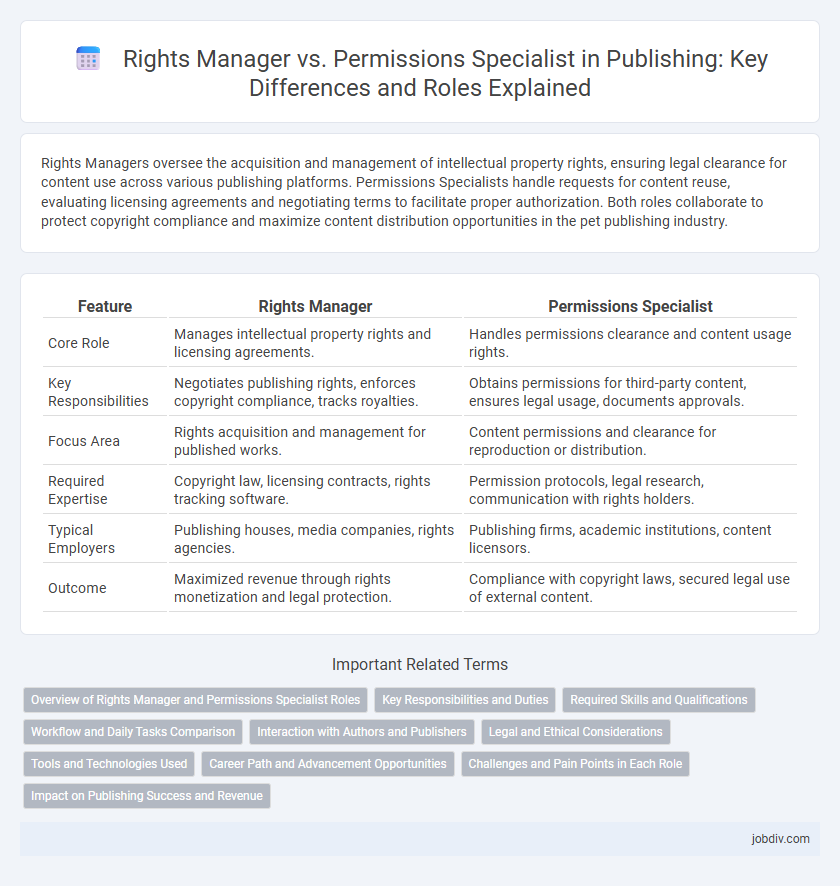Rights Managers oversee the acquisition and management of intellectual property rights, ensuring legal clearance for content use across various publishing platforms. Permissions Specialists handle requests for content reuse, evaluating licensing agreements and negotiating terms to facilitate proper authorization. Both roles collaborate to protect copyright compliance and maximize content distribution opportunities in the pet publishing industry.
Table of Comparison
| Feature | Rights Manager | Permissions Specialist |
|---|---|---|
| Core Role | Manages intellectual property rights and licensing agreements. | Handles permissions clearance and content usage rights. |
| Key Responsibilities | Negotiates publishing rights, enforces copyright compliance, tracks royalties. | Obtains permissions for third-party content, ensures legal usage, documents approvals. |
| Focus Area | Rights acquisition and management for published works. | Content permissions and clearance for reproduction or distribution. |
| Required Expertise | Copyright law, licensing contracts, rights tracking software. | Permission protocols, legal research, communication with rights holders. |
| Typical Employers | Publishing houses, media companies, rights agencies. | Publishing firms, academic institutions, content licensors. |
| Outcome | Maximized revenue through rights monetization and legal protection. | Compliance with copyright laws, secured legal use of external content. |
Overview of Rights Manager and Permissions Specialist Roles
Rights Managers oversee the licensing and enforcement of intellectual property rights, ensuring proper use and monetization across various media platforms. Permissions Specialists handle requests for content usage, securing legal authorization and managing clearances to prevent copyright infringement. Both roles collaborate to safeguard the publisher's assets while facilitating authorized content distribution.
Key Responsibilities and Duties
Rights Managers oversee licensing agreements, negotiate contracts, and ensure proper usage and protection of intellectual property across various media channels. Permissions Specialists handle requests for content usage, verify copyright compliance, and coordinate with authors or publishers to grant or deny access. Both roles are essential in managing publishing rights, but Rights Managers focus on strategic rights monetization while Permissions Specialists manage day-to-day access permissions.
Required Skills and Qualifications
Rights Managers require expertise in intellectual property law, contract negotiation, and digital rights management to ensure proper licensing and royalty tracking. Permissions Specialists must possess strong research skills, attention to detail, and proficiency in copyright clearance processes to secure necessary authorizations for content use. Both roles demand exceptional communication abilities and familiarity with publishing industry standards.
Workflow and Daily Tasks Comparison
Rights Managers oversee intellectual property rights, ensuring accurate licensing and royalty tracking with a focus on contract negotiation and rights clearance workflows. Permissions Specialists handle detailed requests for content usage, evaluating permissions, processing licenses, and maintaining compliance databases to support publishing teams. Both roles collaborate to streamline content distribution while safeguarding legal and financial interests in the publishing workflow.
Interaction with Authors and Publishers
Rights Managers handle the negotiation and enforcement of agreements with authors and publishers, ensuring proper licensing and royalty distribution. Permissions Specialists focus on obtaining and managing clearance for content reuse, interacting closely with authors and publishers to secure necessary permissions. Both roles require strong communication skills to facilitate transparent and legally compliant collaborations within the publishing industry.
Legal and Ethical Considerations
Rights Managers safeguard intellectual property by ensuring compliance with copyright laws and managing licensing agreements, preventing unauthorized use and potential legal disputes. Permissions Specialists navigate the ethical landscape by obtaining necessary clearances and respecting moral rights, balancing publisher interests with author and creator rights. Both roles require meticulous attention to legal frameworks and ethical standards to uphold integrity within the publishing industry.
Tools and Technologies Used
Rights Managers primarily utilize digital rights management (DRM) software, rights clearance databases, and contract management systems to ensure proper licensing and protection of intellectual property. Permissions Specialists rely heavily on content tracking platforms, licensing request portals, and metadata management tools to streamline the permission acquisition process and monitor usage rights. Both roles increasingly incorporate AI-powered analytics and blockchain technology to enhance rights verification and royalty distribution accuracy.
Career Path and Advancement Opportunities
Rights Managers oversee intellectual property rights and negotiate licensing agreements, often advancing into senior legal or executive roles within publishing houses. Permissions Specialists focus on obtaining and managing usage rights for content, developing expertise that can lead to roles in content management or rights coordination. Both careers offer advancement opportunities through increased legal knowledge, project management skills, and cross-departmental collaboration in the publishing industry.
Challenges and Pain Points in Each Role
Rights Managers face challenges in navigating complex licensing agreements and ensuring compliance across multiple jurisdictions, often struggling with dynamic copyright laws and digital rights enforcement. Permissions Specialists encounter difficulties in obtaining timely authorizations, handling diverse stakeholder requests, and managing the intricacies of publisher policies, which can delay project timelines. Both roles require meticulous attention to detail and effective communication to mitigate risks related to intellectual property and maintain seamless content distribution.
Impact on Publishing Success and Revenue
Rights Managers optimize licensing agreements and copyright enforcement, ensuring maximum revenue from content usage across various platforms. Permissions Specialists streamline the acquisition of permissions for third-party content, preventing legal disputes that could delay publication and reduce market opportunities. Efficient coordination between these roles directly enhances publishing success by protecting intellectual property and facilitating timely access to essential content.
Rights Manager vs Permissions Specialist Infographic

 jobdiv.com
jobdiv.com